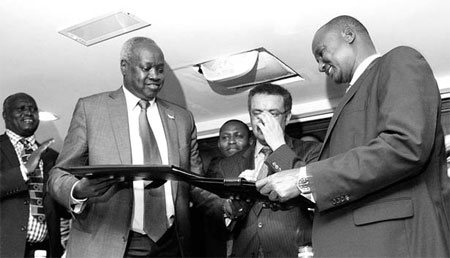Cease-fire signed in South Sudan
South Sudan's government and rebels have signed a cease-fire, but analysts warn that bringing battling gunmen on the ground under control and making the truce stick is far from guaranteed.
Weeks of war in the impoverished young nation is feared to have spiraled out of the control of the political leaders, who themselves bickered for weeks to agree even on a first-stage deal, signed late Thursday in neighboring Ethiopia.
Even as the cease-fire was signed, government delegation head Nhial Deng Nhial said he was skeptical of the rebels' capacity to rein in their forces "given that the bulk of the rebels are made up of civilians" - essentially any of the countless people who have kept hold of their guns for decades.
The fighting has seen waves of brutal revenge attacks, as fighters and ethnic militia use the violence to loot and settle old scores, with the United Nations and human rights workers reporting that horrific atrocities have been committed by both sides.
Finding a deal for lasting peace - and implementing it on the ground - will be the hard part.
"Anything that stops the fighting is welcomed, but it is obvious to say, that implementation is key and past deals in South Sudan have remained little more than ink on paper," said a Western diplomat.
"These two sides have gone so far in a few short weeks ... it was hard enough to get the delegations in Ethiopia to the table, let alone those who have been doing the actual fighting."
The world's newest nation has been at war since Dec 15, with thousands killed and close to half a million forced to flee their homes. Some have sought refuge in UN bases from the ethnic violence, other to large, squalid camps while tens of thousands of others have fled to neighboring countries.
There will be no quick fix: billions of dollars worth of international aid, advice and development help were already poured in to the fledgling nation after the end of civil war with Sudan in 2005, but that cash apparently did little to prevent the terrifyingly swift collapse of the state.
Even for the most careful watchers of the complex power struggles of South Sudan, the conflict - and its brutal nature with neighbor turning on neighbor - were shockingly fast.
The deal, only the first of many steps to hammer out a final peace deal and pave the way for badly needed national reconciliation, leaves a volatile situation on the ground.
Jok Madut Jok, a former senior government official and academic now running the Sudd Institute, said the challenges were huge.
A political settlement, including a potential future deal to compromise on power sharing, could "increase the level of impunity and reward for those who engage in violent efforts to get political office," Jok said.
Many are deeply pessimistic that even with a deal in place, the conflict pitting members of Kiir's Dinka people - the country's largest group - against Machar's Nuer tribe has reached a point of no return.
"With atrocities carried out by both sides, any attempt to pretend communities at odds with each other can simply forgive and forget is nonsense," the diplomat added.
"Hard work and proper reconciliation, not only among politicians but crucially at community level, will be key ... and very hard."
On the ground, the situation appears comparable to that of the 1983-2005 southern civil war when Sudan was a united nation, when the government controlled towns but multiple rebel forces claimed swathes of countryside.
Violence is rooted in decades-old grievances between former rebels turned political leaders, combined with unhealed wounds left over from the civil war that preceded South Sudan's independence from Khartoum in 2011.
Diplomats and mediators from the regional bloc IGAD spoke bluntly of the risks that remained.
"Failure to stop this atrocity and crisis will lead to a protracted conflict that will include all of us," IGAD's special envoy to South Sudan, Seyoum Mesfin, said at the signing ceremony.
Reconciling rivals will need major political changes, said Mahmood Mamdani, a professor at Columbia University in New York and Uganda's Makerere Institute of Social Research, in an article written before the deal.
Warning of a "radically politicized ethnicity", Mamdani said that "opposition to Kiir's leadership is at several levels: personal, ethnic and ideological".
Before the conflict, Kiir "moved to undercut whatever remained of accountability structures within the state and the party in order to hold on to power".
Agence France-Presse
|
The leader of the South Sudan's government delegation, Nhial Deng Nhial (left), exchanges a signed cease-fire agreement with the head of the rebel delegation, General Taban Deng Gai (right) to end more than five weeks of fighting after negotiations in Ethiopia's capital Addis Ababa on Thursday. Birahnu Sebsibe / Reuters |
(China Daily 01/25/2014 page7)









